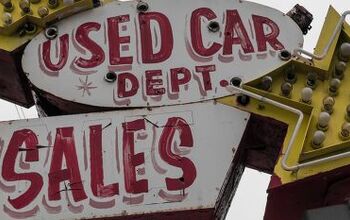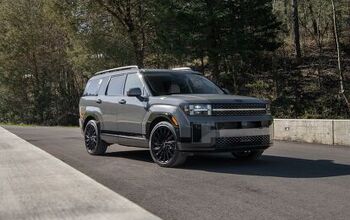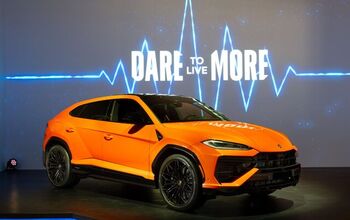Nissan Improves Base Leaf But Tells No One

Suppose an automaker improved a terrible-selling vehicle but didn’t bother to tell anyone about it. Chances are they didn’t just forget, so there has to be some fundamental reasoning behind that choice. This is the mystery Nissan has left us with after silently and suddenly replacing the battery in their base model Leaf with a larger one.
We only know about this change due to an eagle-eyed staff member at Green Car Reports, who noticed that Nissan increased the size of the Leaf S battery in a September order guide.
The larger battery pushes the Leaf’s EPA-estimated range up from 84 miles to a much improved 107. But there’s a trade-off — Nissan has increased the price quite a bit. A base model Leaf S now starts at $32,450, up from the $29,000 range. This increase includes the Quick Charge Package and places it a couple thousand dollars behind the slightly nicer Leaf SV. The new price also places it dangerously close to base models of the Kia Soul EV and Fiat 500E, while actually making it more expensive than a basic Volkswagen e-Golf or Ford Focus Electric.
However, if you still want the shorter-ranged, cheaper version, there are still plenty of 24 kWh cars left over at dealerships. Actually, come to think of it, that may have something to do with Nissan’s silence.
[Image: Nissan]

A staunch consumer advocate tracking industry trends and regulation. Before joining TTAC, Matt spent a decade working for marketing and research firms based in NYC. Clients included several of the world’s largest automakers, global tire brands, and aftermarket part suppliers. Dissatisfied with the corporate world and resentful of having to wear suits everyday, he pivoted to writing about cars. Since then, that man has become an ardent supporter of the right-to-repair movement, been interviewed on the auto industry by national radio broadcasts, driven more rental cars than anyone ever should, participated in amateur rallying events, and received the requisite minimum training as sanctioned by the SCCA. Handy with a wrench, Matt grew up surrounded by Detroit auto workers and managed to get a pizza delivery job before he was legally eligible. He later found himself driving box trucks through Manhattan, guaranteeing future sympathy for actual truckers. He continues to conduct research pertaining to the automotive sector as an independent contractor and has since moved back to his native Michigan, closer to where the cars are born. A contrarian, Matt claims to prefer understeer — stating that front and all-wheel drive vehicles cater best to his driving style.
More by Matt Posky
Latest Car Reviews
Read moreLatest Product Reviews
Read moreRecent Comments
- Slavuta Why is everybody sweating? Like sedans? - go buy one. Better - 2. Let CRV/RAV rust on the dealer lot. I have 3 sedans on the driveway. My neighbor - 2. Neighbors on each of our other side - 8 SUVs.
- Theflyersfan With sedans, especially, I wonder how many of those sales are to rental fleets. With the exception of the Civic and Accord, there are still rows of sedans mixed in with the RAV4s at every airport rental lot. I doubt the breakdown in sales is publicly published, so who knows... GM isn't out of the sedan business - Cadillac exists and I can't believe I'm typing this but they are actually decent - and I think they are making a huge mistake, especially if there's an extended oil price hike (cough...Iran...cough) and people want smaller and hybrids. But if one is only tied to the quarterly shareholder reports and not trends and the big picture, bad decisions like this get made.
- Wjtinfwb Not proud of what Stellantis is rolling out?
- Wjtinfwb Absolutely. But not incredibly high-tech, AWD, mega performance sedans with amazing styling and outrageous price tags. GM needs a new Impala and LeSabre. 6 passenger, comfortable, conservative, dead nuts reliable and inexpensive enough for a family guy making 70k a year or less to be able to afford. Ford should bring back the Fusion, modernized, maybe a bit bigger and give us that Hybrid option again. An updated Taurus, harkening back to the Gen 1 and updated version that easily hold 6, offer a huge trunk, elevated handling and ride and modest power that offers great fuel economy. Like the GM have a version that a working mom can afford. The last decade car makers have focused on building cars that American's want, but eliminated what they need. When a Ford Escape of Chevy Blazer can be optioned up to 50k, you've lost the plot.
- Willie If both nations were actually free market economies I would be totally opposed. The US is closer to being one, but China does a lot to prop up the sectors they want to dominate allowing them to sell WAY below cost, functionally dumping their goods in our market to destroy competition. I have seen this in my area recently with shrimp farmed by Chinese comglomerates being sold super cheap to push local producers (who have to live at US prices and obey US laws) out of business.China also has VERY lax safety and environmental laws which reduce costs greatly. It isn't an equal playing field, they don't play fair.


































Comments
Join the conversation
Matt, If a new Leaf is $13k can you explain your deprecation math for me? http://www.mrmoneymustache.com/2016/10/04/so-i-bought-an-electric-car/
ugly as sin or not I still see this as a great car for a collage student or high school kid, used ones are dirt cheap, now getting kids to make sure it is plugged in may be a problem but if someone could figure out to do the charging via a app collage kids would be fine.